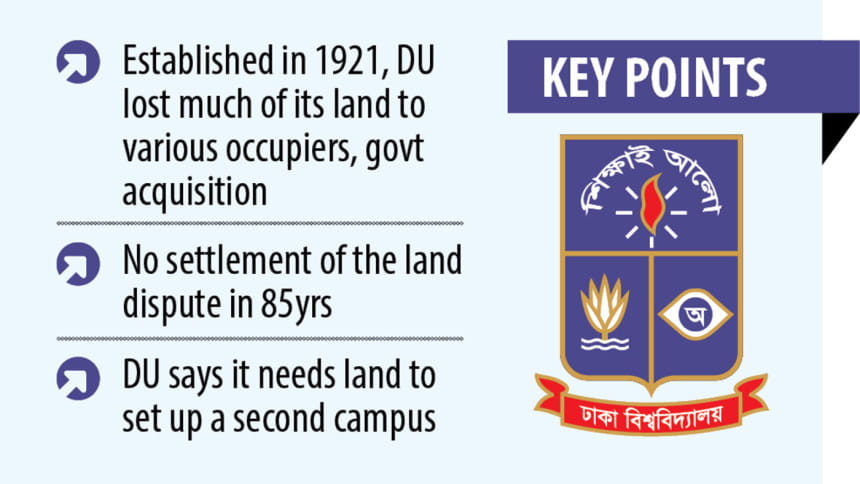Left in legal limbo

The process of handing over 52 acres of land allocated to Dhaka University in 2018 remains halted for four years due to legal complexities.
Rajdhani Unnayan Kartripakkha (Rajuk) gave temporary allotment papers of the land to the university authorities to build a second campus in Purbachal.
Allegations later surfaced that Rajuk created some plots in violation of High Court directives, and allocated these plots to 84 organisations, including Dhaka University. Following the allegations, the HC issued a stay order on the handover process.
Dhaka University was established in 1921 covering around 600 acres. But the land was not registered in the university's name at the time. Later in 1927, a government commission proposed to sanction 257 acres but the university authorities were handed over 252 acres.
In response to continued demand from the DU authorities, the then Pakistan government formed a committee, known as Justice Fazle Akbar Commission, to look into the matter in 1950.
In its report, the commission said the campus size was not adequate and recommended giving another 63 acres to the university on top of the originally sanctioned 257 acres.
But the recommendation was never implemented.
Since the inception of DU, about 57 acres of its land was acquired in phases by different governments during the British period, Pakistan period and even in an independent Bangladesh, according to Dhaka University's Estate Office.
The acquired land includes parts of Dhaka Medical College, Buet, Badrunnessa College, Bangladesh Atomic Energy Commission, National Museum, Anandabazar, Phulbaria, Nilkhet and Anandabazar police outpost.
The university has been trying to recover the land for around 85 years and successive governments assured it of help in reclaiming the land, but no concrete actions were taken.
When the DU started its journey over a century ago, it had 877 students, 60 teachers and 12 departments. It grew over time and now has some 37,000 students, 1,992 teachers, 83 departments, 13 institutes and 56 research centres and bureaus.
With the growth, it needed more land. In the 1990s, the university authorities started raising demand for more land on the outskirts of the capital to build a second campus, holding multiple meetings with different government high-ups.
During the last caretaker government rule, in 2007-2008, the university authorities formed a committee headed by the then pro-vice chancellor Prof AFM Yusuf Haider to formulate a plan for its second campus.
"We held multiple meetings with officials of the Ministry of Local Government, Rural Development and Cooperatives. They asked us to formulate a plan. Subsequently, we formulated a plan and submitted it to the ministry," said Yusuf Haider.
The initiative lost steam after the Awami League government assumed power in 2009, he added.
In November 2017, the DU authorities wrote to Rajuk, seeking an allocation of 100 acres for the second campus.
Rajuk at its 8th board meeting in 2018 decided to allocate 52 acres in Purbachal and gave temporary allotment papers to the DU authorities the same year. The land price was set at Tk 15 lakh per katha, said sources at the university.
This happened despite unresolved legal issues that developed five years prior to this.
In September 2013, eight environmental organisations, including Bangladesh Environmental Lawyers Association (Bela), filed a writ petition with the High Court against Rajuk's move to create new plots.
They argued that Rajuk was creating the plots in deviation of its original plan, which would cause environmental damage.
The court in February 2017 ordered Rajuk not to revise the original plan without the court's permission.
Rajuk did it anyway, creating 84 new plots and allocating them to DU and 83 other organisations. The new plots were created in seven categories, including 39 social infrastructures, 11 nursery schools, four primary schools, seven secondary schools, and 16 colleges and institutes.
When the matter was brought to the court's notice, the HC issued an embargo on the handover process in 2018, said Bela Chief Executive Syeda Rizwana Hasan.
Contacted for the latest update, both DU and Rajuk authorities refused to divulge information. The DU public relations office referred this writer to the University Estate Office, which referred him to the registrar's office, which in turn referred him to the vice-chancellor's office.
When copies of the documents related to the deal with Rajuk were sought in writing, DU Vice-Chancellor Prof Md Akhtaruzzaman said Rajuk already sent them a proposal for the handover.
The Rajuk chairman's office on October 18, 2021, first asked this writer to apply for the information. Later, it referred the matter to a member, who looks after Rajuk's Estate and Land. From there, the matter was referred to the director (Estate and Land) who referred it to the deputy director who in turn referred it to the office of the assistant deputy director.
The writer then filed an application under the Right to Information Act, seeking relevant information. On November 9, Rajuk chairman called him to say that he would like to talk about the matter in person.
During a meeting later that month, Rajuk Chairman ABM Amin Ullah Nuri said the handover process has stalled as a case was pending with the court.
Asked about the DU land, Prof Emeritus Serajul Islam Choudhury stressed the need for recovering the land occupied or acquired by successive governments.
"The university campus should be expanded by recovering the land adjacent to the campus. The plan for establishing a second campus elsewhere is unrealistic," he added.
Tarun Sarkar is a journalist and researcher writing for The Daily Star.

 For all latest news, follow The Daily Star's Google News channel.
For all latest news, follow The Daily Star's Google News channel. 



Comments